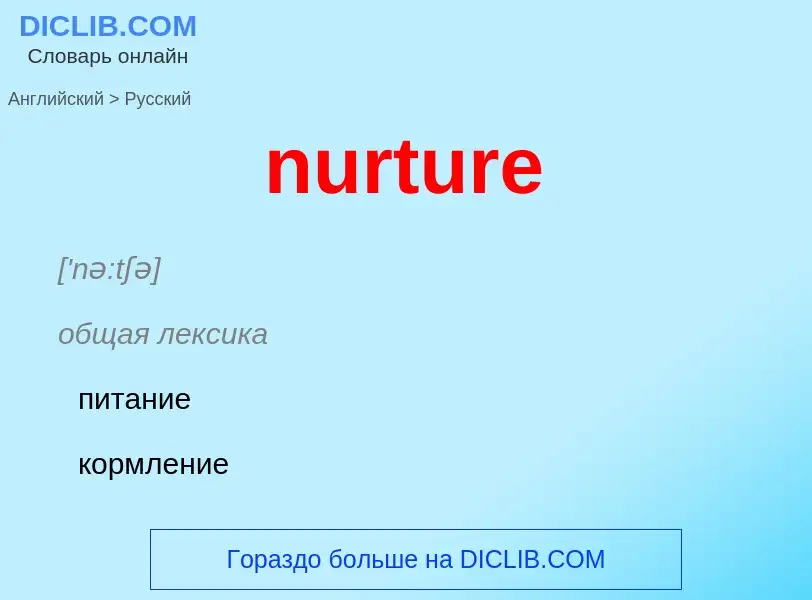Vertaling en analyse van woorden door kunstmatige intelligentie ChatGPT
Op deze pagina kunt u een gedetailleerde analyse krijgen van een woord of zin, geproduceerd met behulp van de beste kunstmatige intelligentietechnologie tot nu toe:
- hoe het woord wordt gebruikt
- gebruiksfrequentie
- het wordt vaker gebruikt in mondelinge of schriftelijke toespraken
- opties voor woordvertaling
- Gebruiksvoorbeelden (meerdere zinnen met vertaling)
- etymologie
nurture - vertaling naar russisch
['nə:tʃə]
общая лексика
питание
кормление
кормить
выкармливать
воспитание
забота о потомстве
воспитывать
существительное
['nə:tʃə]
общая лексика
воспитание
обучение
питание
кормление
пища
еда
корм
сельское хозяйство
выращивание
выведение (породы, сорта)
глагол
общая лексика
воспитывать
обучать
лелеять
питать (привязанность и т. п.)
вынашивать (план и т. п.)
вынашивать (план и т. п.)
питать
сельское хозяйство
выращивать
выводить (породу, сорт)
Definitie
Wikipedia
.jpg?width=120)
Nature versus nurture is a long-standing debate in biology and society about the balance between two competing factors which determine fate: genetics (nature) and environment (nurture). The alliterative expression "nature and nurture" in English has been in use since at least the Elizabethan period and goes back to medieval French.
The complementary combination of the two concepts is an ancient concept (Ancient Greek: ἁπό φύσεως καὶ εὐτροφίας). Nature is what people think of as pre-wiring and is influenced by genetic inheritance and other biological factors. Nurture is generally taken as the influence of external factors after conception e.g. the product of exposure, experience and learning on an individual.
The phrase in its modern sense was popularized by the Victorian polymath Francis Galton, the modern founder of eugenics and behavioral genetics when he was discussing the influence of heredity and environment on social advancement. Galton was influenced by On the Origin of Species written by his half-cousin, the evolutionary biologist Charles Darwin.
The view that humans acquire all or almost all their behavioral traits from "nurture" was termed tabula rasa ('blank tablet, slate') by John Locke in 1690. A blank slate view (sometimes termed blank-slatism) in human developmental psychology, which assumes that human behavioral traits develop almost exclusively from environmental influences, was widely held during much of the 20th century. The debate between "blank-slate" denial of the influence of heritability, and the view admitting both environmental and heritable traits, has often been cast in terms of nature versus nurture. These two conflicting approaches to human development were at the core of an ideological dispute over research agendas throughout the second half of the 20th century. As both "nature" and "nurture" factors were found to contribute substantially, often in an inextricable manner, such views were seen as naive or outdated by most scholars of human development by the 21st century.
The strong dichotomy of nature versus nurture has thus been claimed to have limited relevance in some fields of research. Close feedback loops have been found in which nature and nurture influence one another constantly, as seen in self-domestication. In ecology and behavioral genetics, researchers think nurture has an essential influence on nature. Similarly in other fields, the dividing line between an inherited and an acquired trait becomes unclear, as in epigenetics or fetal development.

.jpg?width=200)

